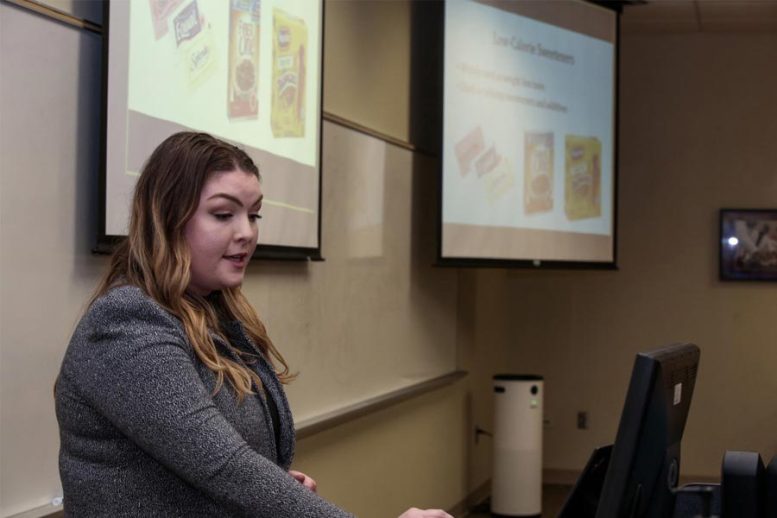
Scientists linked aspartame to anxiety-like behavior in mice in new research. Aspartame is a common artificial sweetener used in many foods and drinks, such as diet soda.
Florida State University College of Medicine researchers have linked aspartame, an artificial sweetener found in nearly 5,000 diet foods and drinks, to anxiety-like behavior in mice.
Along with producing anxiety in the mice who consumed aspartame, the effects extended up to two generations from the males exposed to the sweetener. The study was published on December 2 in the Proceedings of the National Academy of Sciences.
“What this study is showing is we need to look back at the environmental factors, because what we see today is not only what’s happening today, but what happened two generations ago and maybe even longer,” said co-author Pradeep Bhide, the Jim and Betty Ann Rodgers Eminent Scholar Chair of Developmental Neuroscience in the Department of Biomedical Sciences.

Pradeep Bhide, the Jim and Betty Ann Rodgers Eminent Scholar Chair of Developmental Neuroscience in the Department of Biomedical Sciences. Credit: Florida Staet University
The study came about, in part, because of previous research from the Bhide Lab on the transgenerational effects of nicotine on mice. The research showed temporary, or epigenetic, changes in mice sperm cells. Unlike genetic changes (mutations), epigenetic changes are reversible and don’t change the DNA sequence; however, they can change how the body reads a DNA sequence.
“We were working on the effects of nicotine on the same type of model,” Bhide said. “The father smokes. What happened to the children?”
The U.S. Food and Drug Administration (FDA) approved aspartame as a sweetener in 1981. Today, nearly 5,000 metric tons are produced each year. When consumed, aspartame becomes aspartic acid, phenylalanine, and methanol, all of which can have potent effects on the central nervous system.
Led by doctoral candidate Sara Jones, the study involved providing mice with drinking water containing aspartame at approximately 15% of the FDA-approved maximum daily human intake. The dosage, equivalent to six to eight 8-ounce cans of diet soda a day for humans, continued for 12 weeks in a study spanning four years.

Doctoral candidate Sara Jones, lead author of research examining the effects of aspartame, defending her her doctoral dissertation on the topic. Credit: Mark Bauer/College of Medicine
Pronounced anxiety-like behavior was observed in the mice through a variety of maze tests across multiple generations descending from the aspartame-exposed males.
“It was such a robust anxiety-like trait that I don’t think any of us were anticipating we would see,” Jones said. “It was completely unexpected. Usually, you see subtle changes.”
When given diazepam, a drug used to treat anxiety disorder in humans, mice in all generations ceased to show anxiety-like behavior.
Researchers are planning an additional publication from this study focused on how aspartame affected memory. Future research will identify the molecular mechanisms that influence the transmission of aspartame’s effect across generations.
Reference: “Transgenerational transmission of aspartame-induced anxiety and changes in glutamate-GABA signaling and gene expression in the amygdala” by Sara K. Jones, Deirdre M. McCarthy, Cynthia Vied, Gregg D. Stanwood, Chris Schatschneider and Pradeep G. Bhide, 2 December 2022, Proceedings of the National Academy of Sciences.
DOI: 10.1073/pnas.2213120119
Other co-authors were Department of Biomedical Sciences faculty members Deirdre McCarthy, Cynthia Vied and Gregg Stanwood, and FSU Department of Psychology Professor Chris Schatschneider.
This research was supported by Jim and Betty Ann Rodgers Chair Fund at Florida State University and by the Bryan Robinson Foundation.









Post hoc, ergo Proctor hoc. Bad science.
“Led by doctoral candidate Sara Jones, the study involved providing mice with drinking water containing aspartame at approximately 15% of the FDA-approved maximum daily human intake. The dosage, equivalent to six to eight 8-ounce cans of diet soda a day for humans, continued for 12 weeks in a study spanning four years.”
So if I am reading this correctly they gave mice, who weight 1/100 of what a human does, the equivalent dosage of a human drinking 4 12oz cans of diet soda?
And they did it every day for 4 years?
Anyone else see the issue here?
How about I just down a box of aspartame every day for 4 years straight and see if it messes with my mind!?
The issue, Tennis Guy, as vaguely as it’s stated in the article is that in combination with mainstream medicine’s ignorance and incompetence in the areas of long-term chronic subclinical non-IgE-mediated food (minimally) allergy reactions (Dr. Arthur F. Coca, by 1935) and added ‘cultured-free’ MSG (FDA approved in 1980), the frequent ingestion of aspartame by now older parents can help to explain the modern epidemics of mass shootings and suicides, minimally, by their children and/or their grandchildren.
So it messes with your heart and now this, how is this legal to use? the effects sounds like a drug to me.